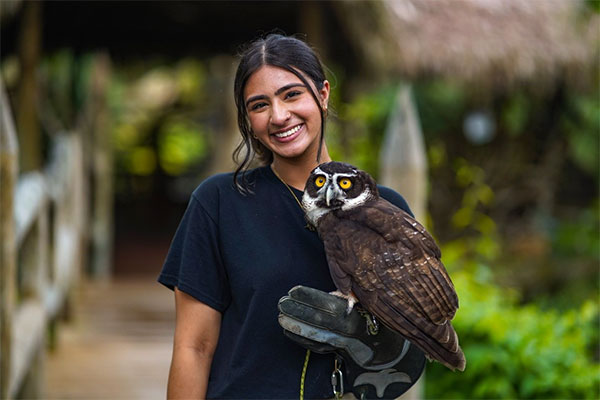Hiba Ali: Using her platform to inspire, educate, and break barriers in veterinary medicine
October 29, 2025
When Hiba Ali began posting videos of herself with lion cubs and primates while volunteering at a small zoo in Miami, she never expected anything to come of it. But when one of her videos garnered millions of views, she knew she had to use her newly formed platform for good. Now, she posts educational content for future veterinary students on both her TikTok and Instagram accounts with a combined audience of more than 200,000.

Known as @dogtorhibz on social media, Ali knew she wanted to be a veterinarian when she saw a three-legged dog at her local animal shelter growing up in south Florida. While she didn’t know what was wrong, she wanted to fix it. “That’s when I realized I wanted to be a doctor, but not for people,” she said.
“At first, I didn’t know what to do with it,” Ali said. “Then I realized I had the opportunity to educate pre-vet students and other minorities that want to be in the field. I decided to take the opportunity and run with it.”
As a Pakistani Muslim woman, Ali recalls growing up never seeing veterinarians who looked like her. Even today she struggles to find fellow students or colleagues who look like her. According to the American Veterinary Medical Association, approximately 8 percent of U.S. veterinary graduates in 2024 were Asian.
“Even within that 8 percent of Asian veterinary professionals, it’s mostly East Asians. South Asians probably make up less than 1 percent. It’s scary. I’m really proud to be a part of that percentage and just make a difference,” she said.
Ali is now the role model she lacked as a child—a South Asian woman pursuing a career in veterinary medicine.
“I’ve had people in the South Asian community direct message me and tell me that what I am doing is amazing,” she said. “It's really important to me to provide something for others that I did not have.”
Ali believes that it's crucial to have diversity within the veterinary field not just for other veterinary professionals, but for the clients they serve.
“I've encountered clients who don’t speak English, and I am the only one who can communicate with them,” she said.
A second-year student with an interest in zoological medicine, Ali said she picked LSU Vet Med specifically for the zoological medicine and wildlife programs. Her passion for zoo med was confirmed for her during her time as a zookeeper at Zoological Wildlife Foundation.
“It’s really interesting to be able to work with species you don’t see on a daily basis,” Ali said. “You look into their eyes and it’s not the same as looking at a domestic cat. This animal knows it can kill you, but it’s not.”
While she worked at Zoological Wildlife Foundation, Ali also worked as a tour guide, educating the public on the animals, their origins, and their endangerment status. Her experience as a tour guide inspired her to focus on conservation.
“I realized that people were really listening to me and caring about what I had to say,” she said. “It made me think that if I could just get more people to listen and care, then maybe we can change the future for these endangered animals.”
With plans to graduate with her DVM in 2028, Ali hopes to work with primates with a focus on conservation after her graduation, volunteering her talents at non-profits when she has the time. Until then, she’ll continue educating, advocating, and building a more inclusive future for veterinary medicine.